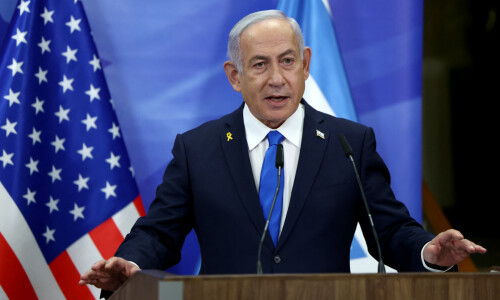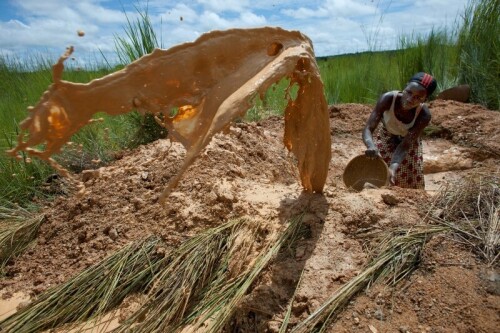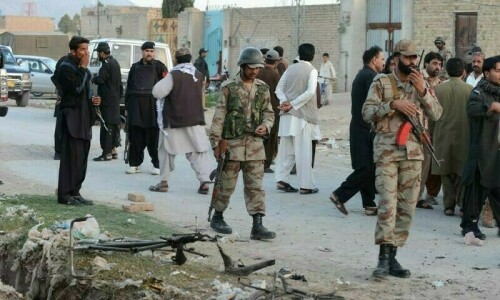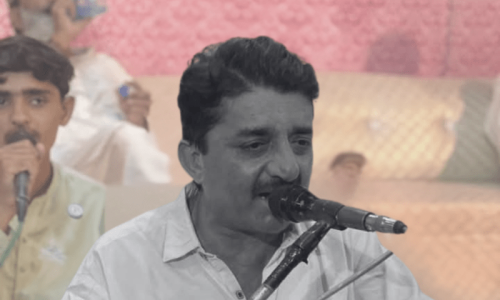ZEITOUN (Gaza Strip): When Israeli soldiers spent two weeks living in Samih al-Sawafiri’s farmhouse, they didn’t just smash his televisions, break holes in his walls and bulldoze his poultry into the ground.
They also left a few messages behind.
Several days into Israel’s 22-day land, air and sea assault on the impoverished Gaza Strip, soldiers rappelled down ropes from helicopters onto Sawafiri’s roof and piled out of tanks after firing shells at his walls while the family was sleeping.
It was early morning, and they were all ordered out. The Israeli army had come to occupy Sawafiri’s home.
“Thank God, we were only made homeless,” he says, surveying the damage to the three-storey building. “They said in Arabic ‘What are you doing here?’ I said ‘I’m sleeping in my house!’”
Food cans, cigarette butts and cartridges are strewn over the floor beside sniper holes and sandbags. A few feathers and a powerful smell in the air are all that remains of 50,000 noisy chickens that once inhabited large pens in the yard.
But most striking is the mural art.
There is a picture of an animal with something scribbled in Russian next to it, numerous Stars of David and a fire engulfing a veiled woman whom a man is holding on a leash.
The written messages are no less stark. “Leave or die” in Hebrew; “…. Gaza” and “…. Hamas” in English. Soldiers have signed what appears to be the name of their army unit.
“They want a land without a people. They want us to go to Rafah, or Sinai,” says Sawafiri, pondering the possible broader meaning behind the words. Rafah is a town on the border of the Gaza Strip and Egypt’s Sinai desert.
An army spokesman told Reuters the Israel Defence Forces would take a severe view of any damage caused to property.
“Furthermore, any such action was a direct transgression of instructions given to our soldiers prior to the mission.”
‘Abused psychologically’
Medical sources say around 1,300 Palestinians died after Israel launched its Gaza assault on Dec 27 with the declared aim of curbing rocket fire into southern Israel from the coastal enclave, which is ruled by Islamist group Hamas.
The army seized control of a number of strategically placed buildings throughout the territory, such as this farming area south of the city of Gaza, outside densely populated districts.
Other areas where soldiers left graffiti on the walls of ransacked homes include Tawam, where olive groves were pulverised in an apparent bid to better defend the seized buildings, and the upmarket Sudaniya district by the sea.
“I feel abused psychologically,” said Saber Nairab, who left his villa when the war began and got a shock on his return once it was over. “They abused my privacy, and to this moment I don’t have the ability to go back to the house.”
One resident of the poor district of Beit Lahiya said he even found human excrement left on his floor.
A short distance away from Sawafiri’s ruined poultry farm lies one of the remaining houses of the Samouni family. At least 30 people, mostly from the extended family, were killed when a house the army had forced them into was subsequently shelled, according to a UN report questioned by Israel.
Helmi Samouni, a survivor of the violence who says he spent several days with the dying and wounded under the ruins, offers a tour of the home the army took control of.
A tombstone has been scrawled on the wall with the words “The Arabs: 1948-2009” in Hebrew, linking the 1948 war that led to Israel’s creation and made hundreds of thousands of Palestinians refugees to the new Gaza operation against Hamas.
“Die you all,” one message reads. “You can run but you can’t hide” and “Gaza, we are here.” Numerous Israeli Stars of David are scrawled on the walls.
“They wanted to repeat 1948. So they forced people from their homes and caused mass murder with their planes,” says Samouni, who lost six members of his immediate family.
“People left once and it won’t happen again,” his cousin Raed adds, referring to 1948.
Hamdy Shaqqura of the Palestinian Centre for Human Rights said the vandalism visited upon Palestinian homes outstripped previous violent encounters with Israeli troops, stretching back to 1967.
“They are trained and recruited on hatred of Arabs, that’s the only explanation for it,” he said. “This is an act of revenge to demonstrate the might of Israel and its military capabilities. I can’t understand it in any other context.”—Reuters















































Dear visitor, the comments section is undergoing an overhaul and will return soon.